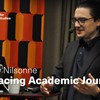experimentdesign

Gustav Nilsonne: Pathways to an Open Science System. Replacing Academic Journals
Open science enables cumulative knowledge and facilitates discovery. The transition to an open science system is underway, but important roadblocks remain. A decentralised, evolvable network of platfo
Gustav Nilsonne: Pathways to an open science system: Replacing academic journals
Venue: Institutet för framtidsstudier, Holländargatan 13, 4th floor, Stockholm, and onlineREGISTERResearch seminar with Gustav Nilsonne, Associate Professor of neuroscience. He is active in meta-sciencOpen science enables cumulative knowledge and facilitates discovery. The transition to an open science system is underway, but important roadblocks remain. A decentralised, evolvable network of platforms interconnected by open standards, and governed by the scientific community, is technically feasible. However, academic researchers remain tied to traditional journals not least because assessment of merit is tied to the venue of publication. Ways forward can include redirection of funding from legacy publishing models to new infrastructure and the development of new methods to assess scientific contributions. Concerted action by stakeholders needs to be combined with pluralistic experimentation on policies and interventions to further open science practices.

Nanda Wijermans
I am an interdisciplinary researcher working at both the Insittute for Futures Studies and the Stockholm Resilience Centre, Stockholm University. I am driven by a deep curiosity to understand dynamics At the Institute for Futures Studies, I explore and develop testable explanations concerning the strength of norms under different levels of risk (e.g. climate change, pandemic). My work is highly collaborative and uses modelling also as a ’tool' for a research process in which different researchers, methods, and/or data are combined.
Olli Kangas: Experimenting with “Basic Income” (BI) in Finland
Olli Kangas, Professor, Director of Governmental Relations, Social Insurance Institution, Kela, Finland ABSTRACT Changes in labour markets, too complex social security system, monetary disincentive prob








